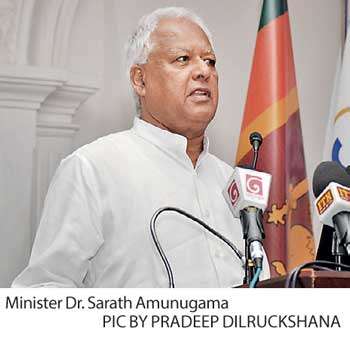22 Jun 2018 - {{hitsCtrl.values.hits}}
 By Shabiya Ali Ahlam
By Shabiya Ali Ahlam
As Sri Lanka is on the lookout for avenues to boost the quality of the products moving in and out of the country, the government yesterday pledged to iron out issues in the local accreditation system and bring it on par with international standards.
Currently it is alleged that the accreditation and certification processes, regardless of the industry, are a lengthy and unproductive system and have taxed local businesses, losing shares in the international markets due to competitors having the edge of getting their products onto shelves faster.
It is also alleged that Sri Lanka’s poor certification processes have resulted in the flooding of substandard products in the local market for local consumption.
Acknowledging issues prevailing in the area of certification and accreditation, Science, Technology and Research Minister Dr. Sarath Amunugama assured that all will be done within his power to ensure Sri Lanka’s processes reach international standards.
“We need to have a nation seal to identify the certification from Sri Lanka so there will be no further doubts in our competencies. That is our target.
“We cannot afford to have a reputation where the world sees that such don’t matter to us and that these matters (certifications) can be fixed or negotiated. This will never happen under my watch. I will make sure all those accreditation agencies under my ministry function in a transparent, efficient and conscientious manner,” Amunugama stressed.
The minister made his pledge while addressing the National Conference on World Accreditation Day 2018 in Colombo yesterday.
According to Amunugama, a number of agencies are looking to have the local accreditation process “subverted”. “This is a truth the country must not hide.” The minister stressed that all accreditation must be given in a spirit of honesty, transparency and certainty.
“It is a big responsibility to certify all products entering and leaving the country. We are having problems in certifying tea, rubber, and other primary products. We cannot sweep this under the carpet,” Amunugama said.
It was pointed out that in most of the current regulations of Sri Lanka, mechanisms for implementation are not adequately addressed and no proper regulatory impact analysis has been done thus far.
The minister stressed that it is a requirement of ‘good regulatory practice’ to carry out regulatory impact analysis to make sure the regulations are effectively implemented while giving the intended results.
Highlighted was also that in many cases the implementation is not effective due to the lack of resources, policies and rules, which are not suitable and do not comply with current trade practices.
With the possibility of using accreditation and conformity assessment, according to WTO principles, as an effective supporting tool to implement technical regulations, it was asserted that there is an urgent need to complete the review of technical regulations in this regard, and carry out proper regulatory impact assessment to align the current regulations to meet national and international requirements.
In that context, it was strongly suggested that institutions such as the Sri Lanka Standards Institute (SLSI), Measurement Units Standards and Services Department (MUSSD) and Sri Lanka Accreditation Board (SLAB) work closely in identifying and implementing strategies to improve the quality of products marketed in the domestic market and produced for the export market.
EU will continue investing in Lanka’s accreditation system
The European Union (EU) yesterday said that having acknowledged Sri Lanka’s strive towards boosting trade, it will invest in the country’s accreditation system to ensure food safety, health and a cleaner environment.
Noting that accreditation provides market differentiation and objective proof that products are safe, EU Ambassador to Sri Lanka and the Maldives and Head of Delegation Tung – Lai Margue opined an effective accreditation system will help Sri Lanka to act locally, but think globally about the quality of its exports.
“The possibilities for Sri Lanka to develop better regulations and to have better monitoring and inspection schemes that protect citizens and the environment, relies enormously on the technical capacity of laboratories, inspectors and certification entities.
In other words, the country will depend and rely on having more and better accredited conformity assessment bodies,” said Margue told the National Conference on World Accreditation Day 2018 held yesterday.
It was pointed out that within the framework of the EU-funded EU-Sri Lanka Trade-Related Assistance Project, UNIDO’s work with Sri Lanka Accreditation Board addresses several aspects of ensuring a safer world.
While the project aims to address the training needs identified by Sri Lanka Accreditation Board (SLAB), the agency is supported to align with the changes in the international standards for laboratory accreditation.
Extensive training of assessors has been carried out on the revised ISO/IEC standards and a series of awareness trainings have been facilitated for conformity assessment bodies to make the transition smoothly.
Margue said that the project will continue to support SLAB in training and capacity building with respect to accreditation to personnel certification, proficiency testing agencies and product certification, covering organic and geographical indication
18 Nov 2024 12 minute ago
18 Nov 2024 1 hours ago
18 Nov 2024 1 hours ago
18 Nov 2024 1 hours ago
18 Nov 2024 1 hours ago